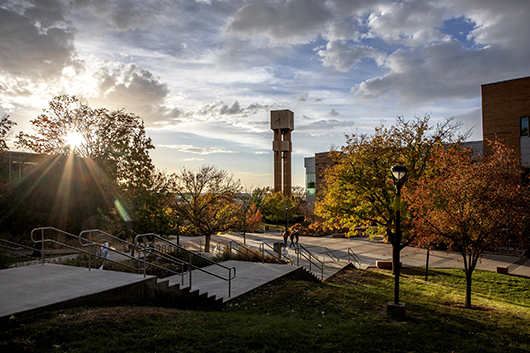Weber State to develop degrees, certificates taught in Spanish to foster strong bilingual workforce
OGDEN, Utah — With help from a $2.5 million grant from the Utah Governor’s Office of Economic Opportunity, Weber State University is developing a program that will offer certificates and degrees through classes taught entirely in Spanish.
“This is one of the first programs of its kind nationwide, and the very first in Utah,” said Ryan Starks, GOEO executive director. “We see this as an opportunity to upskill our workforce, especially in northern Utah where there’s a higher population of Spanish-speaking people.”
The Building Puentes program will offer “stackable credentials” — courses designed to build on each other so that a certificate could count toward an associate’s degree, which could then count toward a bachelor’s deg ree in the same area of study.
ree in the same area of study.
Weber State will soft-launch the program this fall with several classes taught in Spanish, then further develop the program over the next five years, taking curriculum already taught in English and tailoring it for Spanish speakers.
By 2028, the university plans to offer a bachelor’s degree in computer science, with plans for several other associate’s degrees. Weber will also offer nine certificates in skills such as web essentials, cybersecurity and other high-demand areas.
“We’re starting with these areas where there’s high industry demand and broad marketability,” said WSU President Brad Mortensen. “We’re also providing this in a completely online format to meet the needs of our Spanish-speaking population.”
With Hispanics and Latinos being the second-largest ethnic group in Utah and the United States, Weber State wants to be a leader in meeting the needs of the workforce by graduating career-ready, bilingual graduates, Mortensen said.
The Building Puentes program will see Weber State hiring more Spanish-speaking faculty and staff, developing training and translating course materials into Spanish.
“Our ultimate goal is student success in both the classroom and the workplace, so we’re going to offer additional bilingual support courses and services,” Mortensen said.
Students in the program will be placed in English as a second language courses most appropriate for their English language proficiency, which will serve as co-requisite courses to the content-based curriculum taught in Spanish.
As the program grows, WSU will hire more bilingual academic advisors and tutors. The university also plans to award scholarships to help cover costs of course materials and the technology necessary to complete the program.
The university’s strategic plan includes a strong commitment to becoming an emerging Hispanic-Serving Institution with at least 15% of the student body identifying as Hispanic or Latino.
“We’re focused on meeting prospective and current Hispanic students and their families where they are, and helping them get where they want to go,” Mortensen said.
Both Mortensen and Starks noted how Weber State is helping lead the nation in preparing a growing segment of the population to meet ever-increasing industry demands for a skilled workforce.
“For us, it’s about supporting our economy, filling important jobs in the right sectors, in the state’s key industries,” Starks said. “We care about education, we care about businesses and we care about our Hispanic community.”
Bryan Magaña, public relations director
801-626-7948, bryanmagana@weber.edu- Contact:
Pam Allcott, Multilingual Programs director
801-626-6575, pamallcott@weber.edu